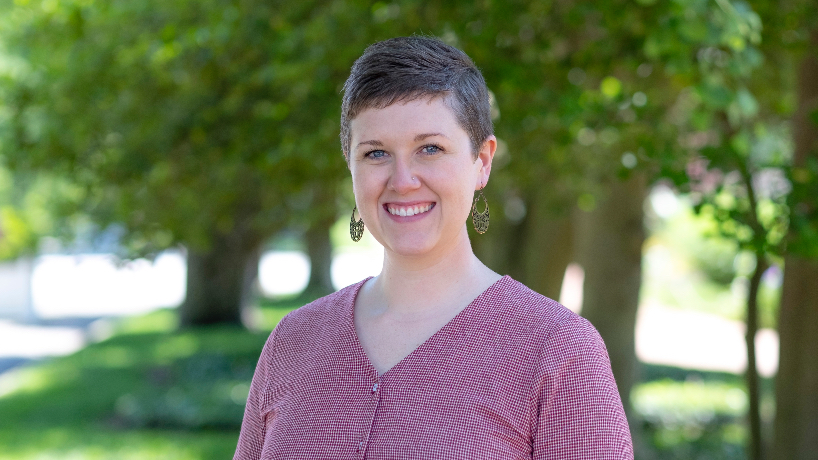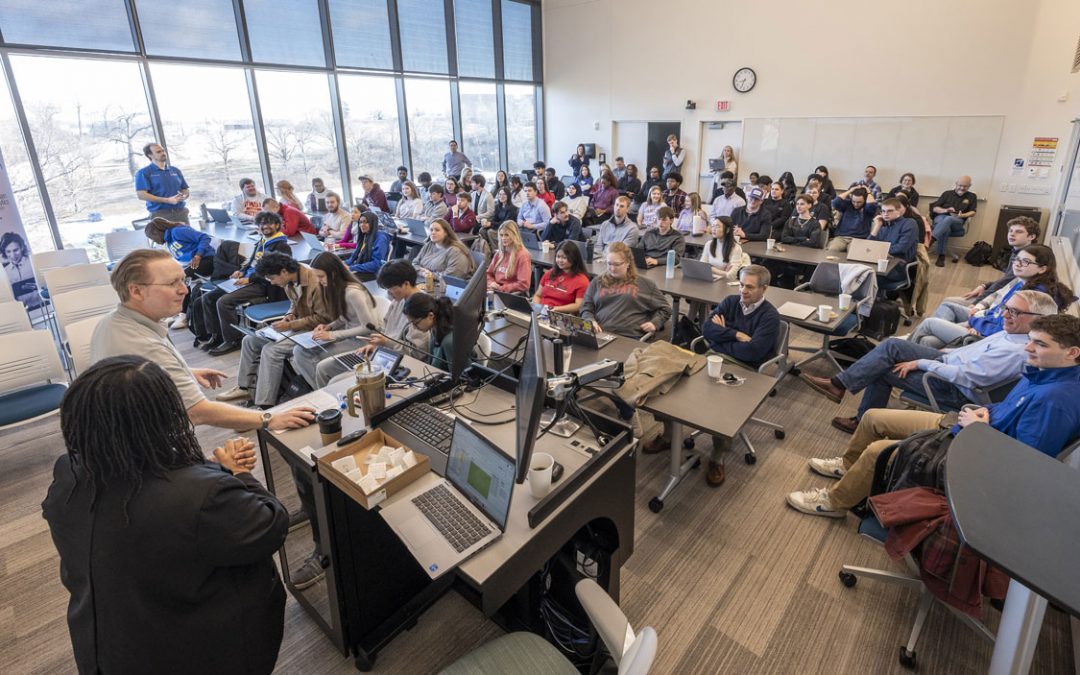
Elizabeth Eikmann developed an archive of information on 19th and 20th century suffrage activism as part of an internship at the Gateway Arch National Park. U.S. Courts featured her work on suffragist Virginia Minor in a video meant to inspire students to become politically active. (Photo by August Jennewein)
Elizabeth Eikmann pulled a yellowed newspaper clipping from a box of old photographs, pamphlets and news articles. She’d been digging through boxes for a few hours, slowly forming a small collection of 19th century artifacts related to St. Louis women’s voting rights.
It was a slow process, but each clipping and photograph provided new insight into the life of Virginia Minor. The article Eikmann held detailed how Minor had lost a Supreme Court case, but that was just part of her story.
Together, the artifacts provided a picture of the suffragist movement in St. Louis.
Eikmann, a 2013 University of Missouri–St. Louis alumna with a bachelor’s in English and a certificate in gender studies, was compiling research through a summer 2019 internship at the Old Courthouse, part of the Gateway Arch National Park. She was tasked with developing an archive of information related to 19th and 20th century suffrage activism in conjunction with the 100th anniversary of Missouri’s ratification of the 19th Amendment to the Constitution. Eikmann focused on suffrage activity from the 1860s to around 1920.
The United States Courts took notice of her efforts and featured her in a short video, “The Courts and You: From Suffragist Sashes to Antiwar Armbands,” that chronicled the stories of Minor and Mary Beth Tinker, a teenage activist who opposed the Vietnam War.
“We did it in one of the judicial court buildings downtown, which was kind of cool,” Eikmann said. “I’ve never done anything like that before. I’ve been interviewed for stuff before, but not with the production they had – lights and make-up. That was fun.”
With the 100th anniversary of the 19th amendment coming up in August, U.S. Courts was interested in producing a video for middle and high school students that looked at historic activism and inspired them to get involved in political issues. A video crew came from Washington D.C., and Eikmann’s commentary was included in the final version, along with images of artifacts she discovered related to Virginia Minor.
“She’s certainly well-known among local historians looking at local politics,” Eikmann said. “She’s the figurehead for suffrage activism in St. Louis in the 19th century. For someone being so central to that story, we know little about her. Are we accurately telling the story? How can new information we find change our understanding of suffrage activism? What will that mean for us today?”
Minor founded one of the earliest organizations devoted to suffrage in the United States. She and her husband, a lawyer, believed that the 14th Amendment gave women the constitutional right to vote. In 1872 Minor tried to register to vote in an upcoming election, but the local registrar prevented her.
She and her husband sued. The trial was held in what is now a library on the second-floor rotunda of the Old Courthouse, and they ultimately lost. They appealed and their case was heard by the U.S. Supreme Court, where they lost again.
Nevertheless, Minor and other suffragists in St. Louis helped pave the way for the 19th Amendment to be added to the Constitution.
“The more we find out about these fundamental figures, the more we find out about other people who were connected to them who have been lost in our historical memory,” Eikmann said. “There were so many names of women that popped up in newspaper articles or were buried in the archive, names that I hadn’t seen before. We still don’t know tons about them, but we at least know their name. That’s a start.”
Researching history is a far cry from what Eikmann imagined she’d pursue when she first came to UMSL as a nursing major. She’d chosen the university because of the Pierre Laclede Honors College, which her high school Spanish teacher recommended.
“The Honors College offered the best of both worlds,” Eikmann said. “You can have this small, close-knit community experience on a larger research campus. It was great having small seminar classes with the mix of big lecture classes.”
Honors classes introduced her to a range of subjects outside nursing, and Eikmann was surprised to find she enjoyed history and English classes more than nursing courses. Her mentor Rob Wilson, an assistant teaching professor and community engagement coordinator in the Honors College, encouraged her to consider American studies.
Eikmann found a perfect fit in American studies’ combination of literature and history.
“The way the field got its start in the 1920s was historians were like ‘What can we learn about history by studying literature?’” she said. “And literature scholars were like ‘What can we learn about literature by studying history?’ These two fields came together. Now it’s a lot more interdisciplinary than that.”
After graduating from UMSL with a bachelor’s in English, Eikmann started working toward her PhD in American studies from Saint Louis University.
Her dissertation, titled “From Footnote to Foreground,” stems from a visual culture class.
“I became really interested in photography and the ways it visualizes the ideas that circulate in our social worlds, like how photography constructs hierarchies of difference, like race or gender,” Eikmann said. “Part of my dissertation is recovering the photographic history of St. Louis, but the other part is exploring the ways in which practitioners of photography in St. Louis were also participating in the cementing of ideologies of race and gender that still persist today.”
Although her research covers the 1850s to the early 1900s, she pointed out that St. Louis was a particularly active photography hub in the 19th century, with a large number of studios located downtown. The city also boasted a journal dedicated to photography, which was run by a woman for the majority of its operation.
The St. Louis Mercantile Library and State Historical Society of Missouri located on UMSL’s campus have proven to be invaluable resources for Eikmann’s doctoral work and research on Minor.
Memorabilia from the League of Women Voters in St. Louis, an organization founded in 1919 that still exists today, were especially helpful. Stacks of boxes revealed long-ago pamphlets, pins, banners and scrapbooks showcasing suffragists’ efforts.
The Mercantile Library hosted numerous speakers in its nearly 200-year history, including Susan B. Anthony and Elizabeth Cady Stanton. During her research, Eikmann happened across a handwritten letter from Anthony asking about a room to hold a lecture on women’s suffrage.
Beyond poring over artifacts at the library, Eikmann has remained connected to UMSL since her graduation. She’s taught courses as an adjunct instructor in the Department of Sociology, and she’s a member of the Alumni Leadership Council Committee and the Honors College affinity group. Eikmann has volunteered to help with the Honors College Trivia Night every year since she was a junior.
In December, she joined the Alumni Association Governing Board as part of her mission to remain engaged with the university.
“One of the things I hope to do as a member of the governing board is to be able to connect with current students and help them envision themselves as an alum who wants to get engaged right away, like I did,” she said. “Where I am today in terms of my studies, what I want to do as a teacher, all of that was formed while I was at UMSL. I don’t think I would be where I am today or have an appreciation for my city like I do today if it weren’t for them.”














